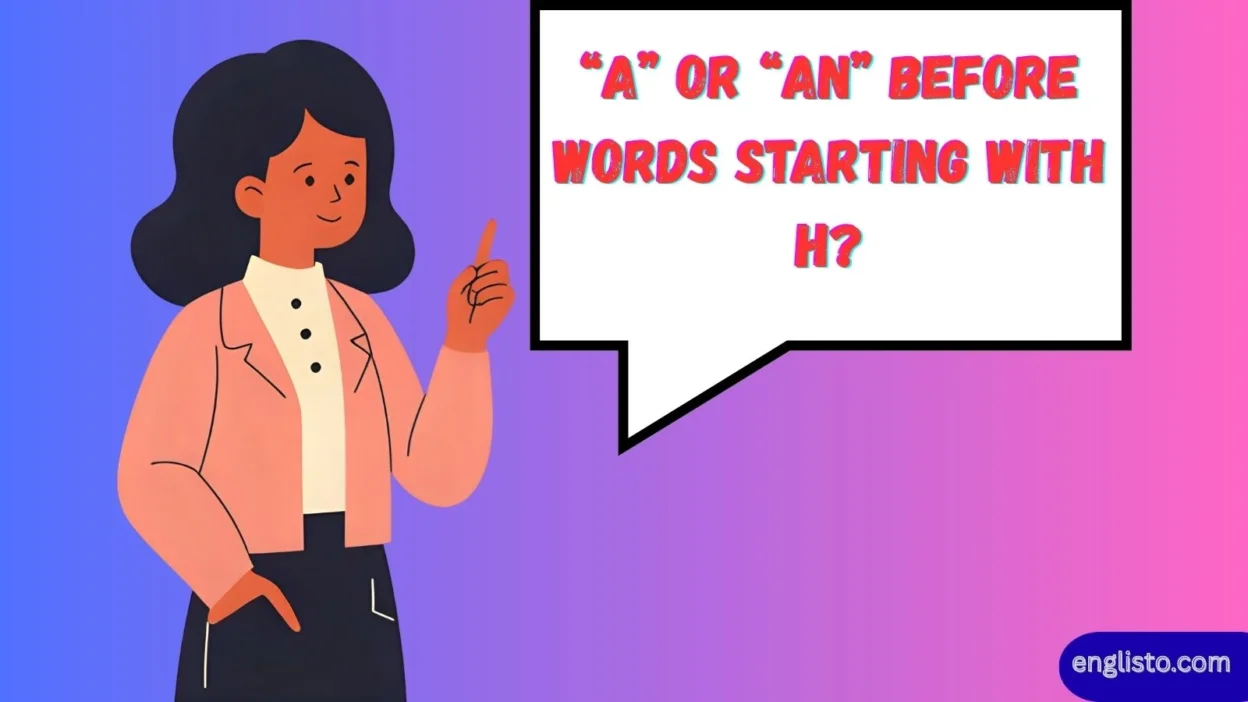Choosing whether to use “a” or “an” before words starting with H often puzzles even native English speakers. You’ve probably asked yourself questions like: Is it “a historic moment” or “an historic moment”? Should I say “an hour” or “a hour”?
The answer depends not just on spelling but also on pronunciation, phonology, dialect, and tradition. English grammar can be quirky, and the case of H-words is one of the quirkiest.
This article breaks down the rules, real-life usage, examples, exceptions, and the history of this fascinating grammar point. By the end, you’ll know exactly when to use “a” and when to use “an” with H-words—whether you’re writing essays, emails, or just chatting with a friend.
Why Articles Matter in English
Articles—“a”, “an”, and “the”—may look small, but they shape meaning in powerful ways. They tell us whether something is definite or indefinite, specific or general.
- A / An → Indefinite articles (not specific, any example of something).
- The → Definite article (specific, known example).
When it comes to a vs. an, the real rule isn’t about letters. It’s about sounds.
- A is used before consonant sounds.
- An is used before vowel sounds.
Notice the word sounds—not letters. That’s the golden rule we’ll apply to H-words.
Read More: Hang Out to Dry – Definition, Meaning, and Real-Life Examples
The Core Rule: It’s About Sound, Not Spelling
Think of this rule as simple phonology:
| Rule | Example | Correct Article |
| Consonant sound | hat, house, happy | a hat, a house, a happy child |
| Vowel sound | hour, honor, heir | an hour, an honor, an heir |
So, the choice depends entirely on whether the H is pronounced.
When H Is Silent
Some English words starting with H come from French or Latin roots, where the H is not pronounced. In such cases, the word starts with a vowel sound, so we use “an”.
Examples:
- an hour
- an honor
- an heir
- an honest man
- an honorary degree
These are fixed expressions. No educated speaker would say “a hour” or “a honor.”
When H Is Pronounced
In most English words, the H is aspirated (pronounced with a breathy sound). That means it’s a consonant sound, and we use “a.”
Examples:
- a hat
- a house
- a hospital
- a hero
- a historic building (modern trend)
Here, saying “an hat” or “an house” sounds old-fashioned and wrong.
The Special Case of “Historic” and “Historical”
This is where debates heat up. Some writers and speakers (especially older British English) used “an historic”. Why?
- In older English, the H in “historic” was weakly pronounced or even dropped.
- People said “istoric,” so “an” felt more natural.
But in contemporary English, the H is pronounced clearly: “historic.” That’s why style guides like the Chicago Manual of Style and Merriam-Webster recommend “a historic” today.
| Usage | Considered Correct Today? | Example |
| an historic | Old-fashioned, formal, British tradition | “an historic event” |
| a historic | Modern, standard English | “a historic moment” |
Pro tip: If you want your writing to feel modern and natural, stick with “a historic.”
Real-Life Examples in Sentences
- She waited an hour before the bus arrived.
- The mayor gave a historic speech in the city square.
- He’s an honest man, even when it’s difficult.
- That’s a horrible idea—please don’t do it!
- We had a happy surprise at the meeting.
Accent and Dialect Influence
English isn’t spoken the same everywhere. Pronunciation varies, and that affects whether people say a or an before H-words.
- British English (older usage): “an hospital,” “an historic occasion” (now fading).
- American English: “a hospital,” “a historic event” (modern standard).
- Cockney / Dialects: H-dropping in words like house → ’ouse, which could make someone say “an ’ouse.”
This shows how phonology interacts with social identity, history, and culture.
Words That Commonly Confuse Writers
Here’s a handy reference table for tricky H-words:
| Word | Pronunciation | Correct Usage |
| Hour | silent H | an hour |
| Honor | silent H | an honor |
| Honest | silent H | an honest answer |
| Heir | silent H | an heir |
| Herb (AmE) | silent H | an herb |
| Herb (BrE) | pronounced H | a herb |
| Historic | pronounced H | a historic event |
| Hotel | pronounced H | a hotel |
| Hypnotic | pronounced H | a hypnotic trance |
Common Mistakes and Why They Happen
- Confusing letters with sounds
- People think “H is a consonant, so it must take ‘a.’” Not true when it’s silent.
- People think “H is a consonant, so it must take ‘a.’” Not true when it’s silent.
- Hypercorrection
- Some learners say “an historic” to sound formal, even though modern English prefers “a historic.”
- Some learners say “an historic” to sound formal, even though modern English prefers “a historic.”
- Mixing American and British rules
- In the U.S., it’s “an herb.” In the U.K., it’s “a herb.”
- In the U.S., it’s “an herb.” In the U.K., it’s “a herb.”
- Overgeneralizing rules
- Assuming all H-words work the same, when they don’t.
- Assuming all H-words work the same, when they don’t.
The History Behind It
The confusion comes from centuries of language contact.
- After 1066 AD, Norman French influenced English vocabulary, bringing words with silent H (e.g., honor, honest).
- Over time, English pronunciation shifted. Some H’s were “restored” (hotel, historic), others stayed silent (hour, heir).
- Older British writers often kept “an” before words with weak or dropped H.
This is why you still see “an historic” in literature and speeches, especially from the 19th and early 20th centuries.
How Dictionaries and Style Guides Treat It
- Merriam-Webster: Recommends “a historic.”
- Oxford English Dictionary: Notes both but labels “an historic” as archaic.
- Chicago Manual of Style: Always use “a historic.”
- MLA Style: Prefers “a historic.”
Quick Grammar Checklist for “A” vs. “An” Before H
- Is the H silent? → Use an (an hour, an honor).
- Is the H pronounced? → Use a (a house, a hospital).
- Is the word historic / historical? → Use a in modern English.
- Writing for formal British literature or speeches? → “an historic” may appear.
Practice Sentences (Try Filling In)
- She gave me ___ honest opinion.
- We visited ___ hospital yesterday.
- They waited for ___ hour in the rain.
- It was ___ historic victory for the team.
- He became ___ heir to the throne.
(Answers: an, a, an, a, an)
FAQs
Q1: Why do some people still say “an historic”?
A: It’s a traditional form from older British English when “historic” was weakly pronounced. Today, it’s mostly stylistic.
Q2: Is it “an herb” or “a herb”?
A: In American English, the H is silent → “an herb.” In British English, the H is pronounced → “a herb.”
Q3: Do acronyms starting with H follow the same rule?
A: Yes. It depends on sound. “An HIV test” (because it starts with aitch), but “a HUD program” (because it starts with huh).
Q4: Can I use either “a” or “an” with historic?
A: Technically yes, but “a historic” is standard in modern usage. “An historic” sounds old-fashioned.
Q5: What’s the easiest way to remember the rule?
A: Forget the spelling. Say the word out loud. If it sounds like a vowel, use an. If it sounds like a consonant, use a.
Conclusion
The debate over using “a” or “an” before words starting with H boils down to sound, not spelling. Silent H-words take “an” (an hour, an heir, an honor). Pronounced H-words take “a” (a house, a hospital, a historic moment).
Older traditions like “an historic” survive in formal British English, but modern usage—and every major style guide—prefers “a historic.”
So next time you’re unsure, don’t overthink the letter. Listen to the sound. That’s the secret.



